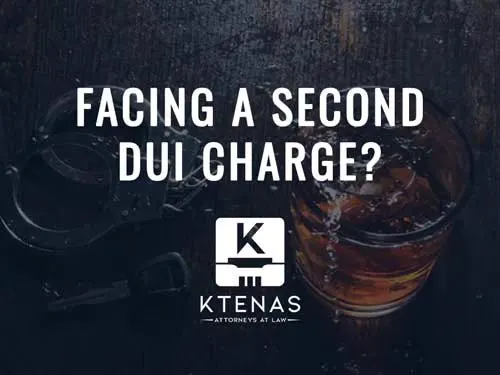
08/06/2024
8 minutes of reading
Call Us Today For a Free Consultation 312-800-1626 312-800-1626
© 2025 Ktenas Law LLC. All Rights Reserved


08/06/2024
8 minutes of reading
Being arrested for a second DUI in Chicago can lead to significant legal consequences, including harsher penalties than those associated with a first offense. These penalties can range from longer license suspensions and heavier fines to mandatory alcohol education programs and even jail time. The seriousness of a second DUI charge means that every decision you make from this point forward can have a lasting impact on your future.
If you’ve been charged with a second DUI in Chicago, it’s crucial to seek professional legal assistance. An experienced DUI attorney in Chicago can help you understand your options, challenge evidence, and work toward minimizing the penalties you may face. Call Ktenas Law at (312) 756-8652 today to start building your defense and protect your rights.
Illinois has strict DUI laws, and penalties increase significantly for repeat offenders. Unlike a first DUI, which may be treated as a misdemeanor with lighter penalties, a second DUI conviction results in:
Since a second DUI shows a pattern of repeat offenses, the court takes it much more seriously, making it crucial to understand all legal consequences. In Cook County, DuPage County, and Lake County, courts often impose stricter penalties depending on the circumstances of the arrest, such as the driver’s blood alcohol content or if the DUI resulted in bodily harm. In the case that someone died in the accident, it can be classified as reckless homicide, which carries additional criminal penalties.
A second DUI conviction in Chicago comes with higher financial penalties compared to a first offense. These fines and fees include:

In some cases, if a second DUI involves an accident resulting in bodily harm, fines may be significantly higher. Additionally, the court may require the defendant to cover damages related to the accident, especially if the motor vehicle was uninsured at the time of the offense.
A second DUI in Illinois is classified as a Class A misdemeanor, meaning jail time is possible. Sentencing may include:
Repeat DUI offenders often face stricter probation terms, including random alcohol testing and restrictions on their ability to purchase or consume alcohol. If the DUI resulted in bodily harm, jail time is often unavoidable, and the sentence could be upgraded to a felony.
Losing driving privileges is one of the most significant consequences of a second DUI in Chicago. Penalties include:
The process for getting a license reinstated after a second DUI is complex and requires:
If a driver was arrested for drunk driving with a blood alcohol concentration (BAC) of 0.16% or higher, penalties may be even more severe, and the chances of obtaining an RDP are reduced.
Illinois requires all repeat DUI offenders to complete mandatory alcohol education and treatment programs. A second DUI conviction typically results in:
Failure to complete court-ordered programs can lead to harsher penalties or extended license suspension periods. Defense attorneys often argue for rehabilitation programs instead of jail time, especially in cases where the defendant is willing to seek treatment.
Outside of the severe consequences associated with these criminal charges, receiving a DUI can have an impact on several other areas of your life:

A repeat DUI conviction in Chicago can have far-reaching consequences beyond just legal penalties. From job prospects to higher insurance premiums, the impact on your personal and professional life can be severe. It’s essential to understand these consequences and seek skilled legal guidance to minimize the damage.
Choosing the right lawyer for a DUI charge is crucial, as the consequences can be much more severe than a first offense. In Cook County, DuPage County, or Lake County, it’s important to find a lawyer who has experience handling second DUI cases and understands the local legal landscape. Here are some key factors to consider:
Second DUI offenses carry harsher penalties, including longer license suspensions, higher fines, and possible jail time. You need an attorney who has experience with second-offense DUI cases, as they will be familiar with the specific legal nuances and strategies to address these more serious charges. They should understand how a second DUI impacts your driving record and have a track record of successfully handling similar cases.
A lawyer’s history of case results is a critical consideration. Look for an attorney with a proven history of getting cases dismissed, reduced charges, or favorable plea deals for clients facing second DUI charges. They should have a strong reputation in the legal community and demonstrate success in securing better outcomes for clients in situations similar to yours.
Effective communication is essential when working with your lawyer. They should take the time to explain your options, keep you informed of your case’s progress, and provide clear guidance on what to expect. Your lawyer should also offer a legal strategy tailored to your specific case, whether it involves challenging the evidence, negotiating with prosecutors, or exploring alternative sentencing options like treatment programs.
A second DUI conviction can have serious, long-term consequences, including increased penalties and the potential for a permanent criminal record. Choosing an experienced DUI defense lawyer can significantly impact the outcome of your case. With the right representation, you may be able to minimize the penalties, protect your driving privileges, and avoid the more severe consequences of a DUI conviction.
The sooner you get in touch with an experienced attorney, the better your chances of achieving a favorable result in your second DUI case.
A second DUI in Chicago carries severe penalties, including fines, jail time, license revocation, and mandatory alcohol treatment. The long-term consequences can also impact employment, finances, and criminal records.
If you are facing a second DUI charge, you need strong legal representation to protect your rights and explore possible defense strategies. Contact Ktenas Law today for a free initial consultation to discuss your options and build the best possible legal defense for your case with one of our criminal defense attorneys.


